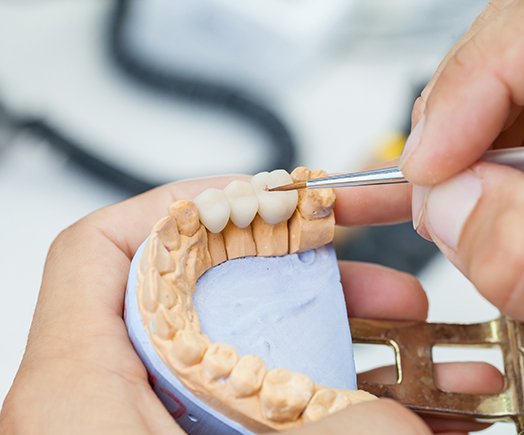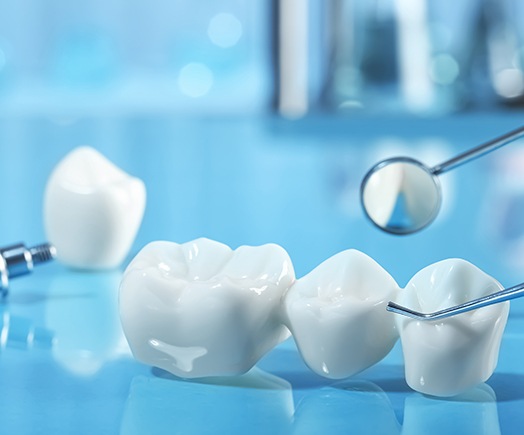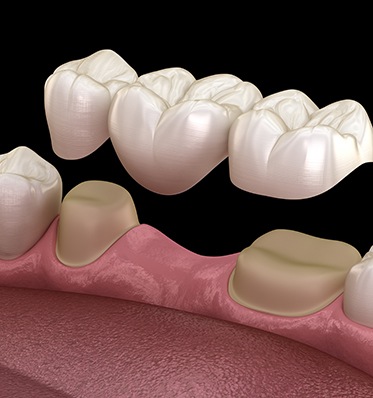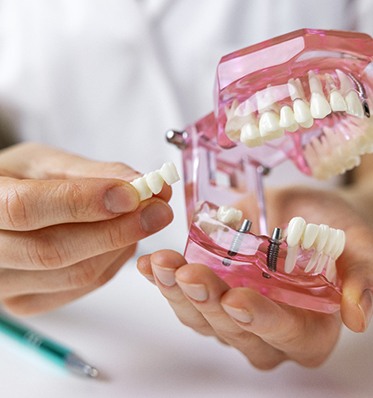Dental Bridges Centennial
Strong & Reliable Tooth Replacement

If you have lost one or more teeth, you should certainly fill the gap in your smile. Otherwise, you might end up with some significant oral health complications. At Homestead Dental in Centennial, we are pleased to offer multiple options for strong and reliable tooth replacement. For example, we might recommend that you receive a dental bridge. Continue reading below to learn more about this treatment, and then contact us when you are ready to book a restorative dentistry consultation.
Why Choose More Smiles Dental Spa for Dental Bridges?
- Advanced Technology
- Lifelike Materials
- Highly Skilled Dentists & Team
What Is a Dental Bridge?

A dental bridge is a multi-unit prosthetic that is designed to replace one or more missing teeth. The name of this type of restoration comes from the fact that it is meant to “bridge” a gap.
There are different types of dental bridges, but typically, they are used to replace 1 – 3 missing teeth in a row. They can be made of different materials, but we often favor lifelike options, such as ceramic and porcelain, because they bear such a strong resemblance to natural tooth enamel.
Types of Dental Bridges

There are several types of dental bridges, each of which comes with its own set of pros and cons. When you visit us for a tooth replacement consultation, we can advise you on which type of restoration would be best for your unique circumstances. We will likely recommend that you receive either a traditional fixed bridge or an implant bridge. Here is an overview of these popular options:
Traditional Dental Bridges

A traditional dental bridge, also known as a fixed bridge, has a crown on each end. The crowns go on top of your remaining natural teeth, and they support one or more artificial teeth between them. Fixed bridges come with a relatively fast treatment process and can provide years of reliable function.
Implant Bridges

Instead of relying on your natural teeth for support, an implant bridge is anchored in place by prosthetic tooth roots (dental implants), which get placed into the jawbone. An implant bridge is incredibly strong and usually does not require that any of the remaining natural teeth be modified.
The Benefits of Getting a Dental Bridge

A dental bridge can prevent many of the complications that often result from tooth loss. For example, it can:
- Prevent teeth from drifting out of place.
- Reduce your risk of future tooth loss.
- Maintain the aesthetic appeal of your smile.
- Allow you to eat a wide variety of foods with ease.
- Keep your jawbone strong and whole (if you receive an implant bridge).
Are you eager to learn more about dental bridges and how this type of restoration might improve your oral health? Our team is eager to answer your questions!
Dental Bridges FAQs
Can You Take a Dental Bridge Out?
No, your dental bridge cannot be removed. It was designed to remain in your mouth for many years following placement. You should not be able to take a bridge out by yourself; it can only be removed by your dentist.
Some healthcare providers refer to partial dentures as “removable bridges,” however, this isn’t completely accurate. Partial dentures are similar to bridges, but one of their key differences is that partials can be removed by the patient at any time and bridges can’t.
Is Getting a Dental Bridge Painful
Getting a Dental Bridge should not be painful, because prior to preparing your teeth, your dentist will ensure that they are numb. Typically, all you’ll need is a topical anesthetic, but patients who have high levels of fear or anxiety may benefit from sedation.
Following the preparation and placement of your dental bridge, your underlying teeth may feel sensitive for the next few days. This can be managed with the help of OTC pain relievers, but please call us if your pain worsens.
Because your bridge has the benefit of preventing your remaining teeth from shifting, it may possibly prevent discomfort caused by dental drift. If you are getting a dental implant bridge, you will likely have some soreness after implant placement surgery, but you will be given aftercare instructions to help minimize pain.
If you’re getting an implant bridge, there will likely be some soreness after your dental implant placement surgery, but you’ll be provided with aftercare instructions to minimize pain prior to your procedure.
Can Dental Bridges Be Whitened?
Unfortunately, no matter the material your dental bridge is made of, it cannot be whitened like your real teeth can. That’s because your teeth have tiny pores in their enamel through which bleaching gels can enter and break up stains, while dental restorations like bridges don’t. Thus, your bridge should always remain the same color.
Thankfully, metal-free bridges were designed to blend into your smile and match your remaining teeth as seamlessly as possible.
To reduce the risk of your natural teeth becoming discolored and making your bridge stand out, consider asking your dentist about professional teeth whitening prior to getting your bridge placed. This way, it will match the ideal shade of your smile!
Can Dental Bridges Get Cavities?
While it is not possible for your bridge to get a cavity, your natural abutment teeth underneath it still can. This is because food debris can become trapped underneath the pontics or in the space where the crowns meet your gums. This can attract dangerous bacteria that could cause cavities, gum disease, or tooth infections.
Thankfully, you can reduce your risk of this occurring by cleaning around and under your bridge every single day. If your bridge is nearing the end of its lifespan, the cement holding it in place may begin to crack, allowing bacteria to enter the cracks and cause a tooth infection, but regular preventive visits to your dentist can help catch these problems before they become an issue.


